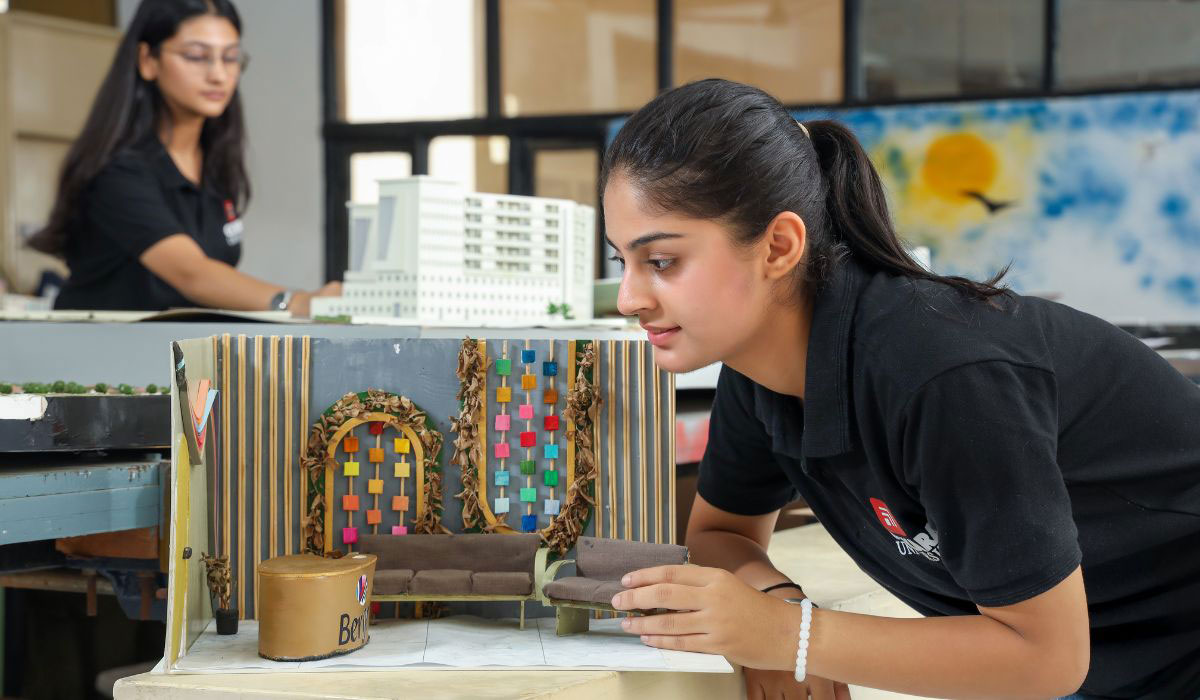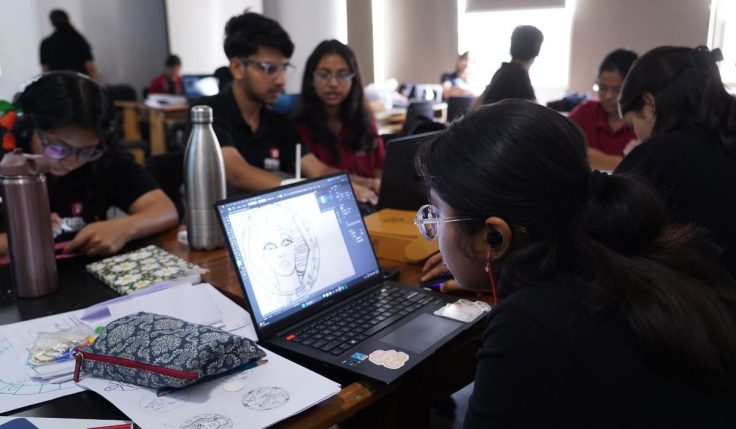Embarking on a professional career in Interior Design requires a combination of creativity, technical knowledge, and practical skills. The completion of a Bachelor of Design in Interior Design is a comprehensive degree that can equip aspiring designers with the tools needed to change spaces and also create environments that are functional and aesthetically pleasing.
In this blog, we will see how to become an interior designer with a Bachelor of Design degree. If you are interested in becoming a successful interior designer, pursue a Bachelor of Design in Interior Design to build a successful career.
The Curriculum of Bachelor of Design in Interior Design
- Bachelor of Design in Interior Design: A program of Bachelor of Design in Interior Design offers a well-rounded education that covers a wide range of essential subjects. These subjects include the ones mentioned below.
- Design Principles and Elements: Gaining a detailed understanding of design, including balance, contrast, and harmony, is important for designing well. These principles can guide the creation of visually appealing and functional spaces.
- Colour Theory: The detailed knowledge of color psychology and the impact of colors on our mood and space perception is important for creating harmonious environments.
- Space Planning: With effective space planning, it can be ensured that the space is functional, efficient, and meets the needs of the users. This also involves understanding human behavior, ergonomics, and spatial relationships.
- Materials and Finishes: You can learn about different materials, their properties, and suitable applications, which also helps in choosing the right finishes for many projects.
Sustainable Design: With an ever-growing focus on sustainability, understanding eco-friendly materials and sustainable design practices is becoming more important. - Interior Design History: A historical perspective on interior design helps students understand many styles and their evolution, which can then inspire and inform their designs.
Skill Development through a Bachelor of Design in Interior Design
- Bachelor of Design in Interior Design: Beyond theoretical knowledge, a Bachelor of Design in Interior Design—B. Des (ID) also focuses on developing technical skills that are important for an interior designer.
- Computer-Aided Design: Gaining proficiency in CAD software is important for creating a detailed and accurate floor plan, elevation, and 3D models. This technology is important for modern interior design practice.
- Building Information Modeling (BIM): The BIM tools help in managing and visualizing building projects, which further allows designers to create an efficient and coordinated design.
- Rendering and Visualisation: Gaining skills in rendering software enables designers to create visualizations of their concepts, which also helps customers understand and approve designs before they are implemented.
- Drafting and Drawing: The traditional hand-drawing and drafting skills are extremely valuable, specifically in the early stages of conceptual design.
Why pursue a Bachelor of Design in Interior Design at Chitkara University?
The Bachelor of Design in Interior Design at Chitkara University is a rigorous, four-year program that can sharpen the student’s ability to conceptualize, research, plan, design, and detail the reinvention of all kinds of interior spaces, including small nuclear family homes, commercial entities, recreational venues, healthcare facilities, and cultural institutions.
- The curriculum sensitizes the students about the impact of interior design on the environment by developing analytical skills for adding excellence and efficiency for the well-being of the occupants.
- A Bachelor of Design in Interior Design program equips students with the concepts and intricacies of technical, theoretical, creative, and management skills for the successful creation and execution of interior design projects.
- The degree helps in creating a firm understanding of a multidisciplinary approach with illustrators, sculptors, fashion designers, and architects for adding creative insights and depth to the design process.
- You can develop skills for creative solutions for the assimilation of different elements of interior design, including furniture, lighting, color schemes, upholstery, etc., along with building services.
- Students can also learn to support the development of research thinking and communication processes to come up with creative and innovative solutions to common design problems.
Program Highlights of Bachelor of Design in Interior Design
- Learn From Highly Qualified Mentors: Chitkara University’s faculty in Planning and Architecture is invested in the growth of students in creative, personal, and professional aspects. The artists, architects, designers, scholars, and educators who teach at Chitkara University work with industry professionals to gain the skills and hands-on experience required to launch a rewarding career.
- Industry-Endorsed Curriculum: The program also reflects a balance of theory and practice required for equipping students with a career where they can create imaginative spaces that serve as functional for aesthetic goals. The curriculum focuses on design studios where you can get hands-on experience in a workshop and digital fabrication lab for building models as you work through design problems and test your ideas.
- Industry Integrated: With a strong professional focus, students who pursue a Bachelor of Design in Interior Design can access internships with designers having real-world experience and strong connections that can serve them throughout their careers. The students are exposed to manufacturers, interior designers, and other design professionals who can support and launch their careers. This helps students to become active members of the design community.
Benefits of Pursuing a Bachelor of Design in Interior Design
- Practical Experience: Interior Design programs include practical experience with internships, workshops, and studio courses. The hands-on approach enables students to use their knowledge in real-world settings by working on projects under the guidance of experienced professionals. These experiences are invaluable for building a portfolio and gaining insights into the industry’s everyday operations.
- Portfolio Development: A strong portfolio is important for any interior designer. With a B. Des (ID) program, students have many opportunities to work on diverse projects, including residential and commercial spaces. These projects, combined with the technical skills, help students create a compelling portfolio that shows their capabilities to potential employers and customers.
- Networking Opportunities: Pursuing a Bachelor of Design in Interior Design offers many networking opportunities with industry events, guest lectures, and alumni connections. You can build a professional network for career growth and open doors to internships, job opportunities, and collaborations.
- Industry Readiness: Graduating with a B. Des (ID) program means that you will become well-prepared to enter the competitive field of interior design. With a combination of theoretical knowledge, technical proficiency, practical experience, and a strong portfolio, graduates can become attractive candidates for employers.
A Bachelor of Design in Interior Design is an invaluable stepping stone for aspiring interior designers. This offers a comprehensive education that also includes design principles, technical skills, and practical experiences.
After completing the Bachelor of Design in Interior Design from Chitkara University, students can become equipped with the knowledge and skills required to create functional, beautiful, and innovative designs. Whether it is aiming to work in a design firm or starting your own business, you can graduate from a B. Des (ID) program and embark on a successful career in Interior Design.






